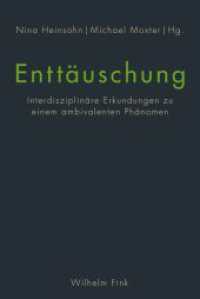- ホーム
- > 洋書
- > 英文書
- > Literary Criticism
Full Description
Uncovers the literary traditions of melancholy that inform major works of postwar and contemporary German literature dealing with the Holocaust and the Nazi period.
In German Studies the literary phenomenon of melancholy, which has a longstanding and diverse history in European letters, has typically been associated with the Early Modern and Baroque periods, Romanticism, and the crisis of modernity. This association, alongside the dominant psychoanalytical view of melancholy in German memory discourses since the 1960s, has led to its neglect as an important literary mode in postwar German literature, a situation the present book seeks to redress by identifying and analyzing epochal postwar works that use melancholy traditions to comment on German history in the aftermath of the Holocaust. It focuses on five writers - Günter Grass, Wolfgang Hildesheimer, Peter Weiss, W. G. Sebald, and Iris Hanika - who reflect on the legacy of Auschwitz as intellectuals trying to negotiate a relationship to the past based on the stigma of belonging to a perpetrator collective (Grass, Sebald, Hanika) or, broadly speaking, to the victim collective (Weiss, Hildesheimer), in order to develop a melancholy ethics of memory for the Holocaust and the Nazi past. It will appeal to scholars and students of German Studies,Comparative Literature, Cultural Studies, Cultural Memory, and Holocaust Studies.
Mary Cosgrove is Reader in German at the University of Edinburgh.
Contents
Introduction: In Defense of Melancholy
The Diseased Imagination: Perpetrator Melancholy in Günter Grass's Aus dem Tagebuch einer Schnecke and Beim Häuten der Zwiebel
The Disenchanted Mind: Victim Melancholy in Wolfgang Hildesheimer's Tynset and Masante
The Feminine Holocaust: Gender, Melancholy, and Memory in Peter Weiss's Die Ästhetik des Widerstands
From the Weltschmerz of the Postwar Penitent to Capitalism and the "Racial Century": Melancholy Diversity in W. G. Sebald's Work
Epilogue: Death of the Male Melancholy Genius: From Vergangenheitsbewältigung to Vergangenheitsbewirtschaftung in Iris Hanika's Das Eigentliche
Bibliography
Index








